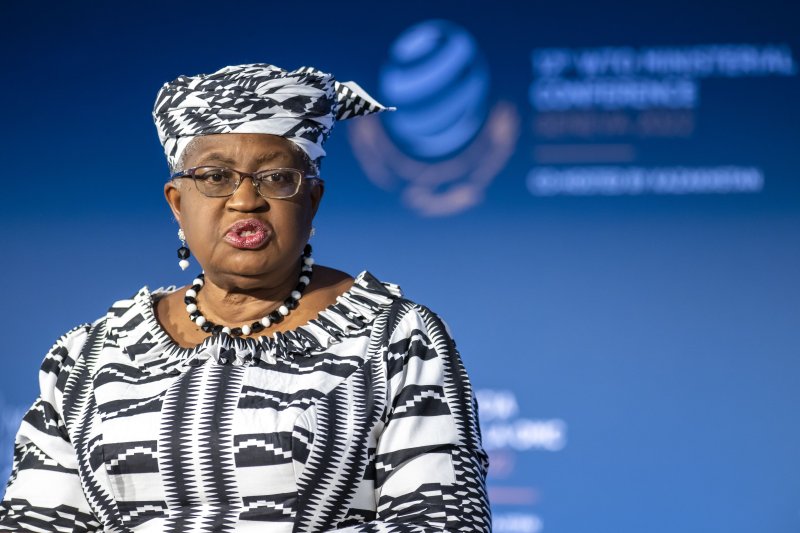Nigeria's Ngozi Okonjo-Iweala, director general of the World Trade Organisation, speaks Sunday at the opening ceremony of the 12th Ministerial Conference taking place until Wednesday, in Geneva, Switzerland. Photo by Martial Trezzini/EPA-EFE
June 12 (UPI) -- The head of the World Trade Organization told member states on Sunday during their first ministerial meeting in nearly half a decade that they need to put thier differences aside and achieve results for a world that is fighting multiple crises, including the war in Ukraine, the pandemic and food insecurity.
Ngozi Okonjo-Iweala, the organization's first African and woman director general, said during her opening remarks at the start the 12th WTO Ministerial Conference in Geneva, Switzerland, that "now, more than ever, the world needs WTO members to come together and deliver."
"Today, with history looming over us, with that multilateral system seemingly fragile, this is the time to invest in it, not to retreat from it," she said. "This is the time to summon the much-needed political will to show that the WTO can be part of the solution to the multiple crises of the global commons we face."
She warned members that they should expect to travel a "rocky, bumpy road with a few landmines along the way" to achieve results by the end of the conference on Wednesday but that they need to overcome these obstacles and demonstrate that the WTO can deliver for the international community as questions swirl around the organization's effectiveness.
The 11th Ministerial Conference, held in Bueno Aires, Argentina, in December of 2017, raised concerns about the abilities of the 164-member body as fissions prevented tangible results.
Okonjo-Iweala acknowledged the negative perception of the organization and though disagreeing with it she said it has deepened trust concerns, and that the WTO should undergo reform.
"Between now and Wednesday, we have a chance to show the world that the WTO can step up to the plate," she said.
She also warned member states that the costs "will be substantial" if they do not produce results and allow for economic and regulatory fragmentation to worsen.
She cited WTO economists who estimate that if the world economy decouples into two trading blocs real global gross domestic product would drop 5%, which is a steeper decline than the 3.5% that rich countries felt during the 2008-09 financial crisis.
"And this 5% estimate represents just the start of the economic damage. Additional losses would come from reduced scale economies, transition costs for businesses and workers, disorderly resource allocation and financial distress," she said. "New trade and regulatory barriers within each block would add to these costs."
During the conference, member states must address the looming food crisis the result of climate change, COVID-19-related supply chain issues, rising prices and the war in Ukraine, she said, adding, if action is not taken, it could mean catastrophe for low-income nations.
She urged member states to allow for the free flow of food and agricultural inputs, especially for humanitarian purposes, and to sign off on a draft resolution to be discussed during the conference on exempting the World Food Program from export restrictions. She also called for further support for poor countries rich in land.
Fisheries will also be a central topic during the conference, with Okonjo-Iweala stating they are to discuss a draft agreement to curb harmful fisheries that contribute to overfishing.
"This agreement is crucial to the 260 million people around the world whose livelihoods depend directly or indirectly on marine fisheries," she said. "It is also central to the sustainability of our our oceans, where the latest studies show close to 50% of stocks for which we have data are overfished."
Concerning the pandemic, she said they have an opportunity to agree to waive WTO protections on intellectual property for COVID-19 vaccines, which she said would enable millions access to the life-saving medicine. They also have a chance to put in measures to prevent and prepare for future pandemics.
The geopolitical tensions are real, she said, but that the member states must not allow them to interfere with their work at the conference -- otherwise the consequences for the WTO and its multilateral trading system would be severe.
"I am optimistic that with the requisite political will -- a word you will hear from me many times -- we can tackle the negotiations in front of us, endorse the declarations and take the decisions that will show the world that the WTO is part of the solution to the world's pressing problems," she said.















